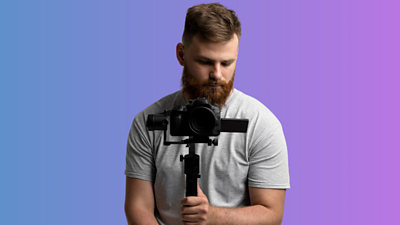Pre-Production
Commissioning
Safeguarding requirements (below) are fully embedded from the planning stages of each project and are outlined by the ÃÛÑ¿´«Ã½ Commissioner during the initial compliance meeting. During the commissioning stage, the Commissioning Editor/Executive is responsible for ensuring that the Indie understands the expectations of the ÃÛÑ¿´«Ã½ and is able to implement and follow safeguarding best practice.
Procurement Vetting
The ÃÛÑ¿´«Ã½ has a ‘duty of care’ towards any child or adult with care or support needs with whom it interacts, regardless of the nature of the interaction, as well as a responsibility to act in the person’s best interests, even if the risk lies externally to the ÃÛÑ¿´«Ã½. All Independent Production Companies ('Indies') and Third Parties are subject to standard ÃÛÑ¿´«Ã½ vetting and procurement processes.
Compliance
Adhering to safeguarding requirements is a mandatory component within the ÃÛÑ¿´«Ã½ Commissioning Specification. You must provide details at the earliest stage of how you will protect the welfare of any children (up to the age of 18 years old) that you engage to contribute to your project, in whatever form.
The ÃÛÑ¿´«Ã½ Safeguarding Team are available to attend compliance meetings in order to answer any questions you may have during the pre-production stage.
A meeting can be booked by clicking the 'Book A Meeting' button below.
ÃÛÑ¿´«Ã½ Safeguarding Standards for Production
Each of the ten headings below provide clear guidelines for stakeholders, helping you to navigate your ethical, legal, and operational responsibilities for working with children on ÃÛÑ¿´«Ã½ output.
Each criterion must be achieved in order to be awarded an overall grade of 'achieving'.
1. A safeguarding policy is in place, or the production is using the ÃÛÑ¿´«Ã½ Safeguarding Policy.
2. The policy has an owner
3. The policy is updated at least annually
4. The policy includes:
- types of risk / abuse
- actions to keep children safe
- SPOC contact details
- responding to a disclosure
- who to report a concern to
- who to escalate a concern to if you are not happy with the response
5. The policy is easily accessible to engaged adults, parents/carers or the local authority
1. A Code of Conduct is in place that all engaged adults follow when working with children.
2. Engaged adults are aware of the Code of Conduct and model expected behaviour
1. Adults (16+) recruited for roles working with children are asked to declare any unspent convictions at hiring stage, plus any new convictions obtained during their period of employment.
2. Adults engaged to deliver education for children can provide evidence of their suitability i.e. qualifications, references and an enhanced DBS (with Child Barred List) check / PVG membership, in line with the ÃÛÑ¿´«Ã½ Safeguarding Tutor Guidelines.
3. Criminal record checks are requested for identified roles that work in close contact with children.
4. Criminal record checks requested by any organisation other than the ÃÛÑ¿´«Ã½ are not accepted; adults who subscribe to the DBS Update Service or who have PVG Membership are asked to provide their check details for cross-referencing any positive content.
5. Production have a secure record of criminal records check information for all eligible adults which includes:
- Type/level of check
- Date of check
- Disclosure number
6. Adults who are awaiting the results of their criminal records check are placed under restricted duties and supervised by another adult who has a valid Enhanced DBS check, or PVG scheme membership. This process is tracked and monitored regularly.
7. There is a documented process in place for managing criminal record checks that are returned with ‘positive content
1. The completion of basic safeguarding training is tracked and monitored by production for all engaged adults.
2. The SPOC has completed advanced safeguarding training within the last 3 years, in line with ÃÛÑ¿´«Ã½ requirements. Evidence of completion is tracked and monitored by production.
3. Chaperones have completed the NSPCC ‘Working With Children in the Entertainment Industry’ online course within the last 3 years and evidence of completion is tracked and monitored by production.
1. The production risk assessment identifies specific risks associated with safeguarding in relation to the production and/or individual children.
2. The production risk assessment includes controls to mitigate identified safeguarding risks.
3. Each risk mitigation has an owner assigned.
4. The production risk assessment is dynamic and updated as new safeguarding risks emerge.
5. The production risk assessment is signed and dated by key personnel.
1. Professional chaperones are engaged to supervise children in line with ÃÛÑ¿´«Ã½ safeguarding policy.
2. The chaperone to child supervision ratio meets or exceeds the ÃÛÑ¿´«Ã½'s suggested 1:6 ratio.
3. There are supervision arrangements in place for 16 and 17 year olds (where applicable).
4. Chaperones are asked to provide the following prior to their engagement:
- An emergency contact
- A copy of their Local Authority licence (Eng/Wales/NI only)
- Evidence of a DBS Enhanced (with Child Barred List) check / PVG scheme membership (issued within the last 3 years).
5. Qualified adults are engaged to provide educational support to eligible children and they are compliant to the ÃÛÑ¿´«Ã½ Safeguarding Tutor Guidelines,
6. Chaperones are provided with access to the ÃÛÑ¿´«Ã½ Safeguarding ‘Chaperone Pack’ prior to commencement and sign to acknowledge receipt.
7. Chaperones have the child/ren they are supervising in their eyeline at all times.
8. Chaperones provide suitable activities for the child/ren they are supervising which are age/ability appropriate.
9. Chaperones are briefed about the individual needs of the children they will be supervising at the earliest opportunity.
10. Chaperones are provided with the contact details of the SPOC and know how to escalate a concern.
11. Chaperones are provided with the remit and contact details of the ÃÛÑ¿´«Ã½ Safeguarding Team.
12. Production has access to alternative chaperone/s in the event that a chaperone is unable to fulfil their duties due to emergency/illness etc.
13. There are separate chaperones in place for overnight supervision of children (where applicable).
14. Chaperones have a daily (or regular) briefing to remain informed of plans involving the children they are supervising
1. All eligible children have the correct performance licence/BOPA in place or are working under an official exemption.
2. The person applying for the Child Performance Licence has a thorough understanding of the consequences of breaching licensing conditions.
3. Copies of each child’s licence are available for inspection on-site, where applicable.
4. Working hours, including tuition periods and rest breaks, are recorded by the Chaperone and stored securely for inspection, in line with official retention periods
1. Children are provided with separate toilets to adults, or, where restricted due to location, toilets are clearly signed and monitored for child use.
2. Children have an individual, private space to dress/change, away from adults and for those aged 5+, other children.
3. Children have a child-only space to relax in which is relevant to their age-group and individual needs (supervised by chaperone). This space has:
- comfortable seating
- access to drinking water
- temperature control
- age-appropriate activities / toys
4. Children have a dedicated space to complete tutoring hours that provides adequate desk-space and room to complete activities.
5. Access to on-site Wi-Fi is restricted with suitability controls in place, or Parents/Carers are advised to equip their child’s internet-enabled device with parental controls prior to arrival.
6. Children are provided with age-appropriate onboarding information that includes who to talk to if they are worried about something or someone.
7. The call sheet contains the SPOC’s contact details.
8. The call sheet contains contact details for the ÃÛÑ¿´«Ã½ Safeguarding Team (including QR code/link to report a concern via Navex: Ethicspoint).
9. The individual needs of children are established at the earliest opportunity in conjunction with the child and their parents/carers. Reasonable adjustments are documented and shared with children, parents/carers and relevant production adults
1. Safeguarding concerns/incidents are recorded on a central, secure system with access controls in place.
2. Parents/Carers are informed of any concerns relating to their child within 24 hours of the SPOC receiving the initial concern (where appropriate to do so).
3. A record of all communications between parents/carers and the SPOC/Chaperone is stored securely.
4. The SPOC conducts a safeguarding briefing with all engaged adults prior to commencement, plus a separate age/ability-appropriate briefing for children.
5. Engaged adults, children and their parents/carers know who to report a safeguarding concern to.
6. The SPOC is aware of the requirement to report safeguarding concerns to the ÃÛÑ¿´«Ã½ Safeguarding Team within the required 24 hour timeframe.
7. The SPOC is aware of how to escalate a safeguarding concern about a child on production, or an adult working with children on production, within their own organisation, to the ÃÛÑ¿´«Ã½ and to the Local Authority
1. The outcome of psychological suitability testing is shared with the SPOC to allow for any identified risks to be discussed and mitigations implemented.
2. Where required, children have access to ongoing psychological support throughout the production and for a determined period of time post-TX.
3. A named person from production is identified to provide support to children and their parents/carers, for a determined period of time for any queries that arise post-TX
Safeguarding Requirements Video
Resources
The following guidance should be used to ensure compliance to ÃÛÑ¿´«Ã½ safeguarding standards.
Safeguarding Awareness: Refresher
Watch the short video below to refresh your safeguarding knowledge before working with children.
Remind yourself of what safeguarding is, the risks for children, the four main types of abuse and how to get support or raise a concern.
Knowledge Check
Check to see if you understand the key principles of safeguarding.
Select the accordion under each question to reveal the answer.
Answer: Children under the age of 18 and adults with care and support needs. It is also important to safeguard yourself.
Answer: Report to your safeguarding point of contact (SPOC) or the ÃÛÑ¿´«Ã½ Safeguarding team.
Answer:
- Physical
- Emotional
- Sexual
- Neglect
Answer: Everyone, regardless of your role at the ÃÛÑ¿´«Ã½ we all have a duty of care to protect children and adults with care and support needs from harm or abuse.
Managing Concerns
Concerns raised in relation to the safety, safeguarding and welfare of children or vulnerable adults must be taken seriously. It is the responsibility of the Indie to ensure appropriate steps are taken to manage any disclosures or concerns in the first instance, in line with their own internal procedures.
The production SPOC should inform the ÃÛÑ¿´«Ã½ Safeguarding Team (plus the ÃÛÑ¿´«Ã½ Commissioner) of any safeguarding concerns in relation to children or adults engaged on production, within 24 hours of receipt of concern. Concerns can be reported online via
Where there is the potential for serious harm to be caused to children, this should be reported to the relevant Local Authority and/or Police as a matter of urgency.
Editorial Guidelines
When working with children and vulnerable adults as contributors, the following sections of ÃÛÑ¿´«Ã½ Editorial Guidelines apply:
The format and the child/young person related editorial aspects of a programme, including how the Indie will meet the Editorial Guidelines in relation to children and young people, should be fully discussed with the ÃÛÑ¿´«Ã½ Commissioning Executive in advance of commission (Editorial Policy may also be consulted). It is important that risk assessments concerning child/young person contributors take account of the Editorial Guidelines.




